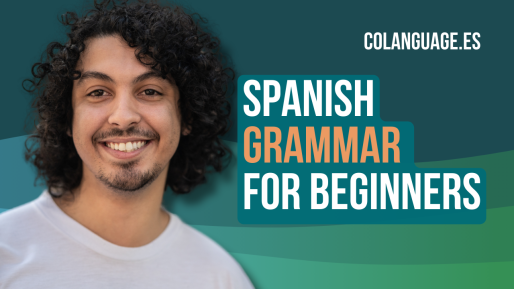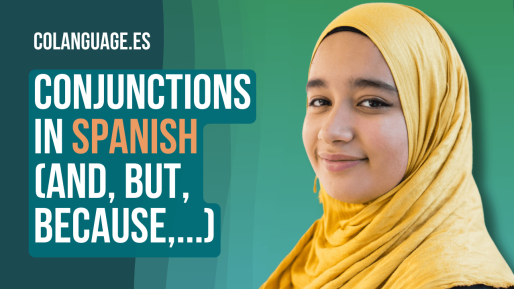Indefinite adjectives in Spanish (some, each, much) Share Copied!
Spanish
In this lesson you will explore indefinite adjectives in Spanish and their usage in everyday conversations.
Video
Podcast
What are indefinite adjectives?
Indefinite adjectives are used to generalise or make a statement about a noun without being specific.
-
Me comí todo el pastel. (I ate all the cake.)
-
Hay varios colores disponibles. (There are several colours available.)
-
Tengo mucho trabajo esta semana. (I have a lot of work this week.)
Indefinite adjectives in Spanish (some, all, many, other...)
This section show how to use indefinite adjectives in Spanish.
| Indefinite Adjective | Spanish | English |
|---|---|---|
| Algún | Algún día iré de viaje a Europa. | Someday I will travel to Europe. |
| Ninguna | Ninguna persona quiere estar enferma. | No one wants to be sick. |
| Toda | Toda persona debe respetar las reglas. | Every person must follow the rules. |
| Mucho | Te has puesto mucho perfume. | You have put on a lot of perfume. |
| Poco | Me queda poco dinero en mi cuenta bancaria. | I have little money left in my bank account. |
| Varias | Hay varias opciones para elegir en el menú. | There are several options to choose from the menu. |
| Tantos | Hay tantos libros en la biblioteca. | There are so many books in the library. |
| Otras | ¿Qué otras preguntas surgieron en la reunión? | What other questions came up at the meeting? |
Sometimes, an indefinite adjective can function as an adverb rather than an adjective.
Te quiero mucho. (I love you very much.)notice how it is placed after the verb and does not complement any noun.
Listening exercise
In this exercise we will learn how to use indefinite adjectives in a dialogue.
| Spanish | English | |
|---|---|---|
| María | ¿Tienes algún problema? | Do you have a problem? |
| Daniel | No, no tengo ningún problema. | No, I don't have any problem. |
| María | Parece que tienes mucho estrés. | You seem to have a lot of stress. |
| Daniel | Es normal, tanto trabajo me deja con poca energía. | It?s normal, so much work leaves me with little energy. |
Generally, indefinite adjectives change their ending depending on the noun they complement.
List of indefinite adjectives (enough, any, such, too much...)
Here you can to see other common indefinite adjectives used in Spanish.
| Indefinite Adjective | Spanish | English |
|---|---|---|
| Cada | Cada estudiante debe entregar la tarea el viernes. | Each student must submit the homework by Friday. |
| Bastante | Tenemos bastante comida para todos los invitados. | We have enough food for all guests. |
| Ciertas | Tengo ciertas dudas sobre el proyecto. | I have certain doubts about the project. |
| Cualquier | Puedes elegir cualquier película. | You can choose any movie. |
| Demasiado | Comiste demasiado en la fiesta. |
You ate too much at the party. |
| Más de uno | Más de uno llegó tarde a clase. |
More than one arrived late to class. |
| Menos de uno | Menos de uno respondió correctamente. |
Less than one answered correctly. |
Some indefinite adjectives do not agree with the gender and number of the noun they complement and remain the same.
Cualquier libro (Any book) masculine, singular.
Cualquier flor (Any flower) feminine, singular.
Listening exercise
In this dialogue, we put into practise what we have learned of indefinite adjectives in a common context.
| Spanish | English | |
|---|---|---|
| María | Cada vez que como comida española, descubro nuevos sabores. | Every time I eat Spanish food, I discover new flavours. |
| Daniel | Sí, se utilizan bastantes especias. | Yes, quite a few spices are used. |
| María | Es verdad, las añaden a cualquier plato. | It's true, they add them to any dish. |
| Daniel | Sí, pero hay ciertas recetas que llevan pocos ingredientes. | Yes, but there are certain recipes that have few ingredients. |
Notice how indefinite adjectives are placed before the noun.
Key takeaways
Here is a quick summary of this lesson.
- Indefinite adjectives help us generalise without having to be specific.
- Some indefinite adjectives agree with the gender and number of the noun the complement whereas others remain unchanged.
- Indefinite adjectives are placed before the noun.
Subscribe to our social media channels to get free daily exercises!



